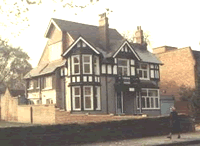
The Islamia Primary School in Brondesbury commenced with a nursery class in October 1983, and took its first batch of Year 1 five and six-year olds in January 1984. The venture was spear-headed by Yusuf Islam, who had purchased a property on Brondesbury Road, Kilburn, for the purpose. Supported by the local community and other well-wishers, Yusuf Islam made the first submissions to obtain state funding in April 1986 but the case remained pending for many years. In May 1990 the then Minister of State for Education refused the application. During the run-up to the General Elections in 1997, Muslim advocacy bodies such as the UK Action Committee for Islamic Affairs (UKACIA) were at the forefront in raising the issue of state funding of Muslim schools at meetings with politicians. State funding – i.e. a voluntary aided primary school maintained by the Brent LEA – did not come through till 1998, after the change of Government from Conservative to Labour (General Election held in 1997).
Papers obtained from the Department for Education and Skills under the Freedom of Information Act now provide further details of the reasons why funding was rejected in the early 1990s. A letter from the Department of Education and Science (dated 24th May 1990) justified its decision on the grounds that “it is not [however] normally the practice of the Secretary of State to approve proposals for the establishment of a new school to be maintained out of public funds where there is evidence of vacancies in existing schools in the area which the proposed school would serve. The Secretary of State was not satisfied in this case that there was a need for additional primary school places in Brent in the vicinity of the proposed school”.
Yusuf Islam then applied for a judicial review in August 1990. On 15 May 1992 the judge ordered the Secretary of State to reconsider his decision. In November 1992 the School offered fresh evidence in support of its application On 18th August 1993 the acting Secretary of State for Education, Baroness Blatch (died 2005) met Yusuf Islam (who was accompanied by Yusuf Abdulla) to tell him that she stood by her decision to reject the application for voluntary aided status for Islamia School. The official minutes of the meeting note that : “…she had been satisfied that all the criteria had been met except that which required evidence of a need for additional places in the area – defined as the area within Brent LEA covering a two-mile radius of the school in question”. The minute records that “Mr Islam said that the decision was a great disappointment. The prospects for the school in terms of a continuing subsidy were very uncertain…in particular he considered untenable the restriction of basic need to the area of Brent LEA…given that Islamia was the only Muslim primary school in the area, he considers LEA borders to be irrelevant. It was inevitable that the Muslim community would feel aggrieved by the decision: it would underline for them the attitude of the British Government towards Muslim communities, notably Bosnia”.
On 20th August 1993, The Independent reported that “the truth seems to be that ministers have hidden behind a technicality to avoid the precedent of supporting an Islamic school. The long period of agonising before Lady Blatch’s announcement suggests that excess capacity was not the chief concern. Rather, the Government was unwilling to take the right and fair decision. Some people will applaud this disingenuous behaviour. Across the political spectrum there are those who argue that official support for Islamia would open the way for many more mjusim schools. This, they say, could mean that most Muslim children would be separated from their peers and confined to a cultural ghetto. They cite fears that girls in Muslim schols would face a poorer education, inconsistent with the sexual equality that is meant to underpin the state system. These are dangerous myths, founded in ignorance…there is no good educational reason for refusing government finance to Islamia. The decision can only confirm Muslims’s feeling that they are a persecuted minority suffering discrimination. Ironically, a decision that reflects fears that Muslims will not assimilate may exarcerbate their sense of isolation”. The obituary notice for Baroness Blatch noted that she was “a quiet, but firm, supporter of Thatcher, and a Christian evangelist, she held very traditional views on education and social issues”. (The Guardian, 1st June 2005)
Further accounts: The school Cat Stevens built: how Conservative politicians opposed funding for Muslim schools in England: click here.
East London Mosque Archives will insha Allah be holding the Minutes of the first management committee of the Islamia Primary School, 1984-85 (M A Sherif deposit, planned)
